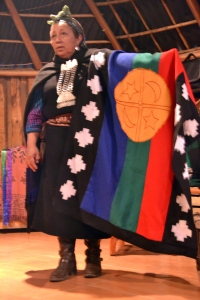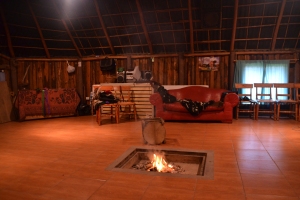¡Hola todos!
I apologize for the huge lapse since my last post, but things have been super hectic lately. For one thing, my classes have (re)started! This doesn’t mean that all the fuss is over; far from it in fact: there was a protest last week and the week before that, and there’s another protest scheduled for the end of this week. But that’s alright; I’m just happy that professors are continuing with lectures and that’s good enough for now. I have no idea how the month-long hiatus (I didn’t have class for the whole of September) will affect my end-of-the-semester plans. My professors have no idea when the semester is going to end either–they might postpone finals until January if the strikes continue–so it’s hard to say at this point where I’ll be (school-wise) in December.
Besides the “study” part of my time in Chile, there’s some exciting news on the “abroad” front as well! In September I was able to spend about a week and half in Argentina. I had a fantastic time checking out Buenos Aires and Iguazú Falls and I’m currently working on a couple of posts about that trip. They should be up by the end of the week (along with pictures…lots of pictures!), so you’ll have that to look forward to :)
My next big trip will be during the second week of December: I’m heading to Peru to see Machu Picchu! Actually, I’m not just seeing Machu Picchu–I’ll be doing a 4 day intensive hike on one of the ancient Inca trails that leads to the ruins from Cusco. From what I’ve heard (and read) it’s a challenging trek but definitely worth it. I’ll share more details as it nears!
But okay, so what have I been up to, right? Well recently my study abroad group went on a field trip to a Ruka Mapuche, or a Mapuche hut/habitation. The Mapuche are one of Chile’s many ethnocultures and have inhabited this region for over 500 years. When I learned that 80% of Chile’s population is indigenous, I was surprised. If you walk around the city and look carefully at advertisements on the metro, billboards, and in the shopping malls you’ll notice you only see one type of person: someone that has light skin and light eyes. Countries near Chile, like Peru and Bolivia, also have a high percentage of indigenous ethnocultures yet these are better represented in the total population, even in large cities like Lima and La Paz. I think this discrepancy is fascinating (albeit unfortunate) so I was glad to have the opportunity to learn more about the history and the culture of the Mapuche.
In Mapudungun, the Mapuche language, the word mapu means land and che means people; Mapuche literally translates to “people of the land”. Similarly, Mapudungun itself breaks down into mapu: land; and dungun: language; “language of the land”. The idea that people belong to the land–instead of the land belonging to the people–is an important characteristic of Mapuche culture. They believe there is an exchange between humans and nature, and that a society is made up of all living things, not just living humans.
The Mapuche conception of time, el eterno-retorno, is cyclical: whereas occidental cultures believe in linear time, the passage from a definite past to present to future, the Mapuche believe that the past lies in front and the future behind, thus completing a circle. You can think of it as a “Lion King ‘circle of life'” sort of thing.
This circularity is reflected in daily rituals. For example: saying hello. Their salutation to one another is mari mari. The greeting is completed by putting both your hands out in front of you, palms facing away, and holding onto the hands of the other person and shaking them briskly. Mari means the number ten in Mapudungun. Mari mari therefore means twenty and refers to the number of fingers present during the greeting. By offering your open palms to each other both are saying, “Everything of mine and everything of yours comes together as one.” If you notice, once the hands are connected, the shape that forms is a circle. Told you circles are important in Mapuche culture!
When we reached the Mapuche village we were taken inside the ruka. It was a spacious hut and very cozy due to a warm fire lit in a hollow opening in the ground.

Blue = life, the universe
Green = the earth, nature
Red = strength
Yellow = sun
White = cleansing
Our guide for the day was José Painequeo, a Mapuche elder who travels the world as a cultural ambassador for the Mapuche people. He gave us a history of the Mapuche, beginning at the time before Christopher Columbus’ “discovery” of the South American continent. “El encuentro de dos mundos es una idea romántica. The meeting of two worlds is a romantic notion,” he began. According to him there were no (or at the least very few) attempts at peace between European conquistadores and American ethnocultures.

However, unlike many other indigenous cultures that were wiped out by the arrival of the Spanish, the Mapuche were successfully able to keep them off their land. In fact, in 1641 in what came to be known as Parlamento de Quilín, the king of Spain, Felipe IV, ratified an agreement between the Spanish and the Mapuche that acknowledged the boundary between Spanish and Mapuche territories. Despite this treaty there was still much violence present between the two groups and heroes soon rose on both sides.
Lefxaru (romanized Lautaro) was an important leader who was one of the few bilingual Mapuche. He learned Spanish as a youth when he was Pedro de Valdivia’s vassal (Pedro de Valdivia was Chile’s first royal governor. In 1540 he led an expedition down from Peru and founded the city of Santiago). Lefxaru grew up learning Spanish in addition to the Mapudungun spoken among the other Mapuche servants. Lefxaru ran away when Pedro de Valdivia wanted to take him back to Spain as his “trophy”. Once he returned to his community he shared his knowledge of Spanish war strategies and came up with counter tactics of his own, which included guerrilla warfare. After fighting the Spanish in several pivotal battles, Lefxaru met a ghastly end: he was killed by Spanish soldiers, decapitated, and then had his head on display for a few months in Santiago’s main Plaza de Armas to serve as a warning to other Mapuche.
Territorial conflicts are nothing new for the Mapuche and they still continue to fight over land today. Militarization of Mapuche communities is periodically on the news and there have been countless cases of brutality by both Mapuche and Chilean carabineros, or Chilean police. Despite violent police “interventions”, José doesn’t hold them responsible: “Ellos no tienen la culpa; son mandados por el estado. The police aren’t to blame; they’re sent by the government,” said José. Besides these skirmishes, hundreds of Mapuche families have been displaced from their homes by companies looking to use that land for projects like building hydroelectric damns. When asked what the Mapuche intend to do about it José replied, “No vamos a llorar nuestra desgracia por eternidad. La vamos a luchar. We are not going to lament our disgrace forever. We’re going to fight it.” In case we got the wrong idea, he clarified: “Cuando uno tiene la razón y la verdad no necesita usar armas. When one has reason and truth [on one’s side], one doesn’t need weapons.”
It was lovely listening to José. As I mentioned before he has been a cultural ambassador for the Mapuche for decades and has participated in many indigenous forums and conventions around the world. He was incredibly knowledgeable about Native American cultures and customs in the U.S. and referred to his friends there as his “brothers”. There is so much similarity between cultures that are so geographically diverse and it felt wonderful to see that connection. José had one wish for the Mapuche culture, and indeed any ethnoculture for that matter: “Queremos que el mundo nos conozca y reconozca. We want the world to know us and recognize us.”
Because it was pouring rain we weren’t able to see the rest of the village, which was a bummer. However José invited us to visit them whenever we wanted. It was a bus ride away from the Santiago centro and he said we would be more than welcome to stop by for a chat. I’m planning on taking up his offer soon; there’s still so much I want to know!
Until next time, take care! I promise more frequent posting will be happening. The next few will be about the Argentina trip, so come check that out! :)

